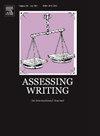Matches and mismatches between Saudi university students' English writing feedback preferences and teachers' practices
Abstract
Though much research has dealt with feedback practices in L2 writing classes, scarce studies have tried to investigate learner and teacher feedback perspectives from a wide angle. Drawing on an 8-dimension framework of feedback in writing classes, this study investigated the potential matches and mismatches between Saudi university students' English writing feedback preferences and their teachers' reported practices. Quantitative and qualitative data was collected using a student questionnaire and a teacher one. The two surveys assessed students' preferences for and teachers' use of 26 writing feedback modes, strategies and activities. A total of 575 undergraduate English majors at 11 Saudi universities completed the student questionnaire, and 82 writing instructors completed the teacher questionnaire. The data analysis revealed that the differences between the students' English writing feedback preferences and their teachers' practices vary from one feedback dimension to another. The study generally indicates that the mismatches between the students' writing feedback preferences and the teachers' reported practices far exceed the matches. The qualitative data obtained from the answers to a set of open-ended questions in both questionnaires provided information about the students' and teachers' feedback-related beliefs and reasons. The paper ends with discussing the results and their implications.

 求助内容:
求助内容: 应助结果提醒方式:
应助结果提醒方式:


